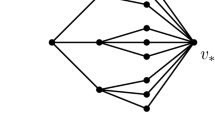Abstract
Schrödinger perturbations of transition densities by singular potentials may fail to be comparable with the original transition density. For instance, this is so for the transition density of a subordinator perturbed by any time-independent unbounded potential. In order to estimate such perturbations, it is convenient to use an auxiliary transition density as a majorant and the 4G inequality for the original transition density and the majorant. We prove the 4G inequality for the 1/2-stable and inverse Gaussian subordinators, discuss the corresponding class of admissible potentials and indicate estimates for the resulting transition densities of Schrödinger operators. The connection of the transition densities to their generators is made via the weak-type notion of fundamental solution.
Article PDF
Similar content being viewed by others
Avoid common mistakes on your manuscript.
References
Applebaum, D. Lévy processes and stochastic calculus, 2 ed., vol. 116 of Cambridge Studies in Advanced Mathematics. Cambridge University Press, Cambridge, 2009
Bogdan K., Hansen W., Jakubowski T.: Time-dependent Schrödinger perturbations of transition densities. Studia Math. 189(3), 235–254 (2008)
Bogdan K., Hansen W., Jakubowski T.: Localization and Schrödinger perturbations of kernels. Potential Anal. 39(1), 13–28 (2013)
Bogdan K., Jakubowski T., Sydor S.: Estimates of perturbation series for kernels. J. Evol. Equ. 12(4), 973–984 (2012)
Bogdan K., Szczypkowski K.: Gaussian estimates for Schrödinger perturbations. Studia Math. 221(2), 151–173 (2014)
Butko, Ya. A. On fundamental solutions, transition probabilities and fractional derivatives. Science and Education of the Bauman MSTU, 1 : 42–52, 2015. DOI: 10.7463/0115.0754986
Cont, R., and Tankov, P. Financial modelling with jump processes. Chapman & Hall/CRC Financial Mathematics Series. Chapman & Hall/CRC, Boca Raton, FL
Dynkin, E. B. Diffusions, superdiffusions and partial differential equations, vol. 50 of American Mathematical Society Colloquium Publications. American Mathematical Society, Providence, RI, 2002
Ethier, S. N., and Kurtz, T. G. Markov processes. Wiley Series in Probability and Mathematical Statistics: Probability and Mathematical Statistics. John Wiley & Sons Inc., New York, 1986. Characterization and convergence
Frazier M., Nazarov F., Verbitsky I.: Global estimates for kernels of Neumann series and Green’s functions. J. London Math. Soc. 90(3), 903–918 (2014)
Grigor′yan A., Hansen W.: Lower estimates for a perturbed Green function. J. Anal. Math. 104, 25–58 (2008)
Grzywny, T., and Szczypkowski, K. Kato classes for Lévy processes. ArXiv e-prints (Mar. 2015)
Hansen W.: Global comparison of perturbed Green functions. Math. Ann. 334(3), 643–678 (2006)
Jacob, N. Pseudo differential operators and Markov processes. Vol. I. Imperial College Press, London, 2001. Fourier analysis and semigroups
Jakubowski T.: On combinatorics of Schrödinger perturbations. Potential Anal. 31(1), 45–55 (2009)
Räbiger F., Schnaubelt R., Rhandi A., Voigt J.: Non-autonomous Miyadera perturbations. Differential Integral Equations 13(1–3), 341–368 (2000)
Sato, K.-I. Lévy processes and infinitely divisible distributions, vol. 68 of Cambridge Studies in Advanced Mathematics. Cambridge University Press, Cambridge, 1999. Translated from the 1990 Japanese original, Revised by the author
Yosida, K. Functional analysis, sixth ed., vol. 123 of Grundlehren der Mathematischen Wissenschaften [Fundamental Principles of Mathematical Sciences]. Springer-Verlag, Berlin, 1980
Zhang Q. S.: On a parabolic equation with a singular lower order term. II. The Gaussian bounds. Indiana Univ. Math. J. 46(3), 989–1020 (1997)
Zhang Q. S.: A sharp comparison result concerning Schrödinger heat kernels. Bull. London Math. Soc. 35(4), 461–472 (2003)
Author information
Authors and Affiliations
Corresponding author
Rights and permissions
Open Access This article is distributed under the terms of the Creative Commons Attribution 4.0 International License (http://creativecommons.org/licenses/by/4.0/), which permits unrestricted use, distribution, and reproduction in any medium, provided you give appropriate credit to the original author(s) and the source, provide a link to the Creative Commons license, and indicate if changes were made.
About this article
Cite this article
Bogdan, K., Butko, Y. & Szczypkowski, K. Majorization, 4G Theorem and Schrödinger perturbations. J. Evol. Equ. 16, 241–260 (2016). https://doi.org/10.1007/s00028-015-0301-7
Published:
Issue Date:
DOI: https://doi.org/10.1007/s00028-015-0301-7



